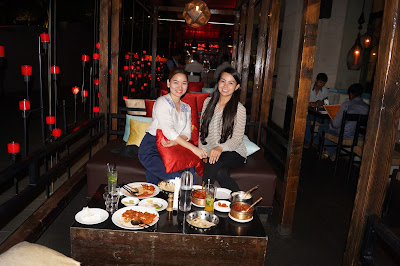One time during briefing, we were asked if we consider being a flight attendant a routine profession. That made me think. Now that I am flying for four years now, I am certain to the answer to that question. Yes it is a routine, in an 'unroutinary' way. Let me just pretend that the word exists in the dictionary. :)
We basically do almost the same thing every time we fly.
1. We participate in pre- flight briefings with the supervisors and/or pursers and cockpit crew to establish relationship and communication prior to starting the flight. This is where introduction is being done, refresh ourselves with emergency procedures, discuss flight details and cabin conditions.
2. We go through immigration, customs and body checks.
3. We reach the aircraft and stow our bags to the compartments.
4. We conduct pre- flight check of doors, emergency equipment and everything else in the cabin and galley like ovens, coffee makers, chillers to make sure everything are working.
5. Once all the ground staff (catering, cleaners, maintenance) are out of the aircraft, we start our security check to make sure there are no suspicious items on board. We open compartments, crew rest areas, lavatories and its mini- compartments, carts, under the seats and everywhere else our hands could reach and and eyes could see.
6. We board passengers with a smile, guide them to their seats and assist as much as we could.
7. When the boarding is complete, we start our ground services like giving out towels or refresher tissues.
8. When the screens are not working for passengers to see the safety demonstration from there, we manually demonstrate the use of safety equipment (seat- belts, oxygen masks in case of decompression, life-vest when flying over water, exits, and safety cards).
9. We secure the cabin for take off (seat- belts fastened, tray tables stowed, seat- backs upright, window shades open). We ensure bags are secured properly (under the seat or in the overhead compartment) and see to it that aisles and emergency exits are free of obstruction. Galleys are to be secured as well. Carts secured and compartments latched and locked.
10. We take our seats for take off.
11. When the seat- belt sign is off, we start our services (newspapers, headsets, giveaways, child and infant gifts, landing cards, beverage, meals/ sandwiches, coffee/ tea, collection, candies).
12. For the remaining duration of the flight, we attend to passenger's needs and requests. We keep the aisle and lavatories clean.
13. When the seat- belt sign comes on for landing, we do the same thing as No. 9.
14. We take our seats for landing.
15. After everyone has deplaned, we ensure no one leaves anything behind.
Those things all the time! Now what makes me consider my job as unroutinary? The answer is 'everything in between'. Now I will use I, instead of we. :)
1. The schedule- It's not a fixed 9- 5 during the day or a fixed shift at night. I wake up and sleep anytime of the day depending on the time of my flight. If my flight requires me to prepare at 8 in the evening, I will try to sleep in the day.
2. The people I fly with is not the same everyday. Some are colleagues I've already flown with. Some are people I'm flying with for the first time. It's nice to reconnect with the old crew and learn something from the new ones.
3. Pre- flight checks and security checks are things I never consider routine. I do it as thorough as I could. I don't want to put my flight to a certain danger because of my own negligence towards my roles.
4. Passengers are something new each time- a hundred and twenty for the smallest plane and almost three- hundred for the biggest one. Someone will be unruly. A few will try to irritate you. I will give them the treatment they still deserve but makes face when I'm hiding in the galley. :D Some would smile back and say thank you. I think I deserve that. While the rest will remain silent throughout the flight. I handle different passengers in many different ways, basing on the situation. And sometimes that way of handling may not work to a different person.
5. During the flight, I sometimes face colleagues who are difficult to deal with and I have to deal with them, anyway. :)
6. Death on board, rejected take- off, fire and/or smoke cases, decompression, unlawful seizure of the aircraft, bomb on board, emergency landing and/or ditching, and all other cases are things I was trained initially and every year. I know what to do by heart but I don't get to face them everyday (God forbid!) to make me skillful.
The list may not end from there.
For me, to be unroutinary, it takes to have full responsibility to the serious matters (safety) and be accommodating, flexible, happy and spontaneous to the rest of the flight.
For me, to be unroutinary, it takes to have full responsibility to the serious matters (safety) and be accommodating, flexible, happy and spontaneous to the rest of the flight.
I realized any other jobs shouldn't be considered routine but it all depends on someone's personality, preferences and likes or dislikes. If anytime you feel like you have a regular way of doing things in a particular order and you get bored to the way things are always done the same way, that means you are stuck. Try to change the pattern and try to do things differently, sometimes or when needed.









